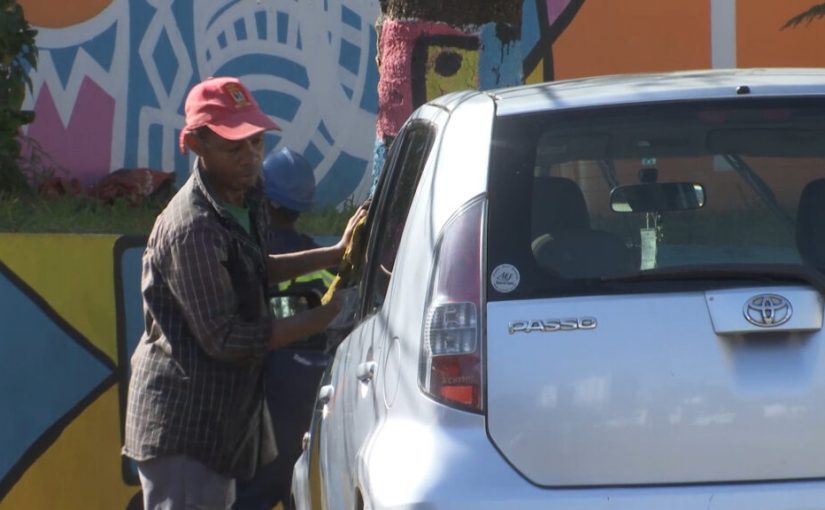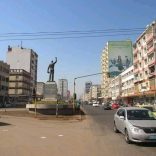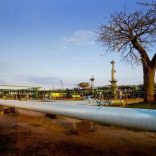Mozambique: Terrorists create panic in Muidumbe - AIM report
Maputo’s streets and sidewalks are a never-ending car-wash

Photo: O País
The washing of vehicles on public roads has been prohibited in Maputo city since 2017, but despite the ban, it’s pretty much ‘business as usual’ city-wide.
Early very morning all over Maputo city, you can see cars parked on the sides of the roads and on the sidewalks being washed and polished.
It’s not something which started yesterday. It’s been that way for years. So, on the pretext of reorganising the city, the city council in the capital decided to ‘regularise’ the process, through Resolution 66/AM/2017 of 30 March, 2017.
“The repair or washing of any vehicle on public roads is prohibited, and drivers must, in the event of a breakdown, place the proper signalling and remove the vehicle immediately by the means at their disposal to places where it cannot interfere with traffic. In cases of vehicle washing on public roads, the fine will be applied to the owner of the vehicle, which may be blocked and towed by the Municipal Police,” the relevant paragraph reads.
In the event of disobedience, whether for mechanic repairs or washing, the fine to be levied is one thousand meticais.
Those involved are aware of the ban, but say they have no alternative, as “life is expensive and difficult for everyone, especially for those of us who didn’t go to school”.
Samuel Wati, known on the city streets as Samito, has been in the car-wash business for almost five years. He has lost count of the times he has seen the vehicle he was washing being “locked and towed” by the Municipal Police.
“In the past, the police monitoring the situation told us not to pour water on the public road, but this has reduced a little. Their attention now is on charging for parking,” said Samito, who works along Avenida Samora Machel, very close to the Municipal Council building.
Lack of employment is the main reason he and others like him stay in the business, prohibited or not.
“Sometimes they clamp the vehicles when they find us washing them, saying we’re damaging the roads and the sidewalks, but there’s no way round it – there are no other jobs,” says Jacinto Vilanculos, another of the capital’s many washers-and-polishers.
We tried to interview the drivers, who actually pay for the banned car washing wherever they decide to park their vehicle. Most were aware of the regulations, but differed in opinion beyond that.
Some, like José Mabjaia, speak of the ineffectiveness of municipal authorities in the face of ‘real problems’.
Mabjaia says the government should concentrate on the real challenges, as “every time they make a decision, they put young people out of work. They tried to expel informal workers downtown, how did it end? Do you think banning is everything? What’s needed is to create conditions so that neither the washer nor the motorist are harmed,” he said.
“They want to take us to the ‘[official] carwash, but are we in a position to pay? Here, on the street, it’s 100 or 50 meticais, with the possibility of negotiating, but in a carwash, no. Just because we have a car doesn’t mean we have a lot of money. We do what we can to lead a dignified life, but it’s not easy,” the vehicle owner says.
Afra Castelo, another driver who agreed to speak to our team, welcomes the ban, despite the effect on his pocket. “I agree with the position, and it must be followed. We must go to the proper car wash, money or no,” he says.
Despite the municipality’s five-year campaign, the activity continues just metres from the Maputo Municipal Council building where the Municipal Police themselves are headquartered.
That, in brief, is how Mozambique’s capital city came to be taken over by badly parked cars, buckets of water, and the rags and brushes and sprays for polishing cars which shine impeccably in the mud of the flooded, cracked sidewalks, streets and avenues.
And one mustn’t forget to mention the formidable amount of garbage coming out of these vehicles – the beer bottles, the cans of energy drinks, the plastic bags with used baby diapers, the lots – which the much in demand and affordable labourers either leave lying right there and then by the door of the sparkling automobile or, in the best case scenario, gently’ place’ against the trunk of one of the still standing trees amidst a car-wash jungle which was once dubbed the city of acacias.












Leave a Reply
Be the First to Comment!
You must be logged in to post a comment.
You must be logged in to post a comment.